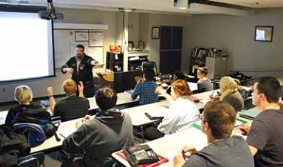 Ah, “The Dirty Dozen.”
Ah, “The Dirty Dozen.”
No, I’m not talking about the iconic western. The phrase popped into my mind when I read this Business Insider story about 12 ways you’re sabotaging your career.
Some of the mistakes are pretty obvious. Acting like you can’t learn anything new, for instance, has “bad move” written all over it. Some are less apparent – and the “offenders” may not even realize their blunders.
Career development specialist and author Sylvia Hepler offers comments on each of the missteps. Here is a memorable trio:
- Criticizing your boss.
Whispering behind his back, carping to her face or making your supervisor out to be wrong, pathetic or inept puts you in the danger zone, Hepler says. “If you’re doing this, don’t expect to land a promotion or last there.” - Wearing your emotions on your sleeve.
Going overboard with disruptive displays of anger, whines of frustration and dramatic tears usually sends messages of warning to bosses, staff and peers, she says. “People may conclude that you can’t manage your feelings, and that’s never a good thing.” - Complaining.
“Chronic complainers generally focus on the problems at hand rather than on the potential solutions,” she explains. “Instead of moaning about policies, processes and people, accept what you cannot change or make recommendations for positive change.”

 Learning the ropes when starting a new job is always challenging. Imagine your position changing soon thereafter to encompass the vast world of human resources.
Learning the ropes when starting a new job is always challenging. Imagine your position changing soon thereafter to encompass the vast world of human resources.
 What do you mean money doesn’t grow on trees? Rats.
What do you mean money doesn’t grow on trees? Rats. Let’s pull a Marty McFly and go back 30 years … this time, to 1985.
Let’s pull a Marty McFly and go back 30 years … this time, to 1985. They say a picture speaks a thousand words. That notion also holds true for State Seals of Biliteracy, which recognize high school graduates who have attained a high level of proficiency in one or more languages in addition to English.
They say a picture speaks a thousand words. That notion also holds true for State Seals of Biliteracy, which recognize high school graduates who have attained a high level of proficiency in one or more languages in addition to English.
 I’m feeling sentimental today. Perhaps it’s because spring is in the air. No matter. There’s something I want to say: Thank you.
I’m feeling sentimental today. Perhaps it’s because spring is in the air. No matter. There’s something I want to say: Thank you. Armed with my Starbuck’s latte, I stepped out into the cold. It was mid-January and I was headed to Evansville to conduct interviews for our education/workforce development issue of
Armed with my Starbuck’s latte, I stepped out into the cold. It was mid-January and I was headed to Evansville to conduct interviews for our education/workforce development issue of